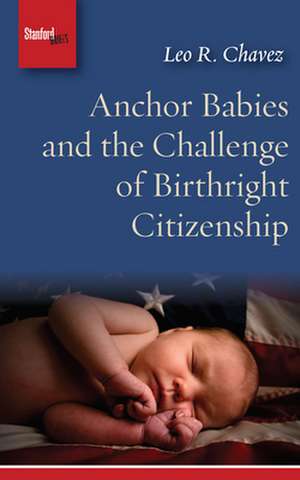Anchor Babies and the Challenge of Birthright Citizenship
Autor Leo R. Chavezen Limba Engleză Paperback – 9 oct 2017
With this book, Leo R. Chavez explores the question of birthright citizenship, and of citizenship in the United States writ broadly, as he counters the often hyperbolic claims surrounding these so-called anchor babies. Chavez considers how the term is used as a political dog whistle, how changes in the legal definition of citizenship have affected the children of immigrants over time, and, ultimately, how U.S.-born citizens still experience trauma if they live in families with undocumented immigrants. By examining this pejorative term in its political, historical, and social contexts, Chavez calls upon us to exorcise it from public discourse and work toward building a more inclusive nation.
Preț: 103.91 lei
Nou
19.89€ • 20.68$ • 16.42£
Carte tipărită la comandă
Livrare economică 14-28 aprilie
Specificații
ISBN-10: 1503605094
Pagini: 120
Dimensiuni: 127 x 201 x 9 mm
Greutate: 0.14 kg
Editura: MK – Stanford University Press
Cuprins
The Prologue introduces the reader to the concept of anchor babies and birthright citizenship. It provides examples of issues and political rhetoric related to anchor babies and the problem of defining the concept. It also lays out the structure and organization of the book as well as the general argument that the anchor baby rhetoric undermines the sense of belonging of U.S.-citizen children by questioning their citizenship on the basis of their parents' immigration status.
This chapter examines media stories about anchor babies and birthright citizenship that appeared in the Los Angeles Times and the New York Times between 1965 and 2015. Media coverage began with stories about birthright citizenship for the children of undocumented immigrants. Early in the 2000s, the term "anchor baby" became part of public discourse and was used to question whether the U.S.-born children of undocumented immigrants deserved citizenship. This chapter traces the politics surrounding the anchor baby rhetoric as well as attempts to legislate changing the Fourteenth Amendment to the U.S. Constitution to deny anchor babies citizenship.
This chapter attempts to put the often hyperbolic rhetoric surrounding anchor babies into a historical framework. The children of immigrants have always had a tenuous position in American society. The Fourteenth Amendment to the U.S. Constitution made birth in the nation, with some exceptions, a definition of citizenship. The Supreme Court, in the Wong Kim Ark case in 1898, made it clear that birthright citizenship applied to the children of immigrants, even when their parents may not have been eligible for citizenship themselves. However, the children of stigmatized ethnic and racial groups still found their citizenship questioned throughout the 20th century.
Citizens living with families that include undocumented immigrants may be subject to policies that diminish their rights as citizens, or they may face verbally and physically aggressive behavior by individuals who challenge their right to belong in America. They also face the daily threat of deportation that would tear apart their families, often leaving them destitute. State policies that deny birth certificates to U.S.-born children not only affect the individuals so denied; they also underscore that the state can disregard the rights of these so-called anchor babies. Such policies also provide evidence of the power of the anchor baby rhetoric to justify policies on the basis of the belief that anchor babies are undeserving citizens.
The Epilogue returns to the book's argument that the anchor baby rhetoric undermines the sense of belonging and citizenship for the U.S.-born children of immigrants. It also shows that the targets of such rhetoric can feel as if they are being singled out as undeserving Americans. It examines the case of Judge Gonzalo Curiel, whose ability to perform his judicial duties were questioned because of his Mexican heritage. The book ends with the hope that the children of immigrants will not let the anchor baby rhetoric diminish them as people and as citizens.
